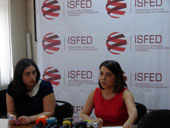
ISFED presents recommendations for pre-election monitoring
By Tatia Megeneishvili.
Monday, August 12
Various types of violations identified during the pre-election period are described in the report, which was published on August 9 by the International Society for Fair Elections and Democracy (ISFED). The report contains facts of violence against political opponents, the illegal use of administrative resources and violations in the agitation process. The report covers the period from July 20 to August 4.
According to ISFED, during the primaries of the United National Movement (UNM), acts of violence organized by former political prisoners and the groups of the society with radical attitude towards the former ruling party were documented. Despite this aggression, the Ministry of Internal Affairs (MIA) secured the safety of representatives of the UNM who took part in the primaries.
The use of administrative resources was discovered during the reporting period. For example, after the election appointment, the Supreme Council of Adjara allocated 13,555,400 GEL for infrastructural and social programs. In addition, the presidential candidate of the Georgian Dream, Giorgi Margvelashvili, attended the event, financed from the budget, where he was presented as the presidential candidate. "Even though Margvelashvili is not officially a registered candidate yet, such actions are opposite to international standards, and it is against the OSCE Copenhagen document, according to which the activity of government should be clearly separated from the candidate's activity," the report says.
Representative of the Georgian Dream Irina Imerlishvili responded to ISFED about this point; saying that if the issue will be discussed by the side of law, Margvelashvili is not registered and in addition, the "changes, initiated by the current government, which means restriction of administrative resources, came into force on August 9, which also means that a non-existing law, could not be violated.”
ISFED believes that the Central Election Administration of Georgia (CEC) by its refusal to register people with dual citizenship, made the wrong interpretation of the constitution. However, Zurab Kharatishvili, Chairman of the CEC, replied to this issue saying that the “decision of the CEC Chair regarding the refusal to register persons with dual citizenship as the Presidential candidates is based on Article 29.11 of the Constitution of Georgia, which states that a citizen of Georgia, who at the same time is the citizen of a foreign country, shall not have the right to hold the position of the President of Georgia.”
According to Kharatishvili, this has been confirmed by the court’s decision and entered into legal force. “Thus, the ISFED assertion that the CEC Chair made an incorrect interpretation of the Constitution does not contain legal arguments and calls the correctness of the court decision into question,” he said, calling on civil society “not to put their assessments above the Constitution and the Court, which will cause doubts regarding their competence and impartiality,”
In their report ISFED also mentioned that during the reporting period there were instances of interference in the media and observation activities. In particular, during the professional activities a Kaspi district council member and his activists put intense pressure on Shida Kartli information center journalist and a long time observer (LTO) Irma Kitriashvili. The organization's LTO was hindered in the Kobuleti district during the implementation of monitoring activities.
In order to ensure the fairness of the upcoming presidential elections, ISFED recommended the government to condemn and split from any facts of violence in the future aimed at hindering the political activities in the country; law enforcement bodies – to do their best to avoid any attempts of violence or use adequate sanctions; political parties and initiative groups – to ensure a distance between the opposing groups or individuals, avoid interference in the activities of independent observation missions or media or any pressure; and the state agencies – to be maximally transparent and open for the international observation missions.

